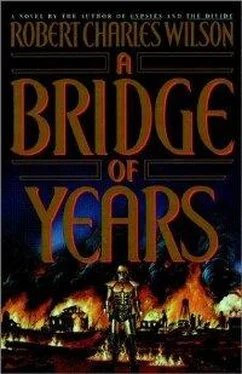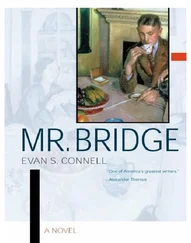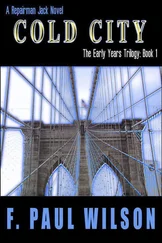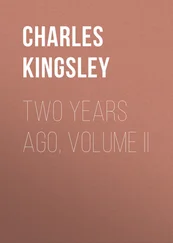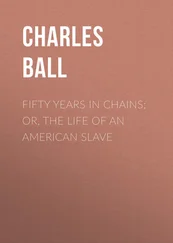She was asleep in bed, stretched out on her side with one hand cupping the pillow. The cotton sheet was tangled between her legs. Her glasses were on the orange crate next to the bed; she looked naked without them, defenseless, too young. Tom watched from the doorway, sipping coffee, until she uttered a small, unhappy moan and rolled over.
He couldn’t begin to imagine what all this might mean to her. First the interesting news item that the man she’d been living with was a visitor from the future … followed by an encounter with something strange and monstrous in a tunnel under the earth. These were experiences nobody was supposed to have. Maybe she would hate him for it. Maybe she ought to.
He was turning over these thoughts when she staggered out of the bedroom and pulled up a chair at the three-legged kitchen table. Tom tilled her coffee cup and was relieved that the look she gave was nothing like hateful. She yawned and tucked her hair away from her shoulders. He said, “Are you hungry?” and she shook her head: “Oh, God. Food? Please, no.
Nothing hateful in the way she looked at him, Tom thought, but something new and disquieting: a bruised, wounded awe.
She sipped her coffee. She said she had a gig tonight at a coffeehouse called Mario’s, “but I don’t know if I can face it.”
“Hell of a night,” Tom observed.
She frowned into her cup. “It was all real, wasn’t it? I keep thinking it was some kind of dream or hallucination. But it wasn’t. We could go back to that place and it would still be there.”
Tom said, “It would be. We shouldn’t.” She said, “We have to talk.” He said, “I know.”
They went out for breakfast in the late-morning sunlight and the hot July smell of road tar and sizzling concrete.
The city had changed, too, Tom thought, since last night.
It was a city lost in a well of time, magical and strange beyond knowing, subterranean, more legend than reality. He had come here from a world of disappointment and miscalculation; in its place he had discovered a pocket universe of optimists and cynical romantics—people like Joyce, like Soderman, like Larry Millstein. They said they hated the world they lived in, but Tom knew better. They loved it with their outrage and their poetry. They loved it with the conviction of their own newness. They believed in a future they couldn’t define, only sense—used words like “justice” and “beauty,” words that betrayed their own fundamental optimism. They believed without shame in the possibility of love and in the power of truth. Even Lawrence Millstein believed in these things: Tom had found a carbon copy of one of his poems, abandoned by Joyce in a kitchen drawer; the word “tomorrow” had been printed with fierce pressure—“ Tomorrow like a father loves his weary children and gathers them up” —and yes, Tom thought, you’re one of them, Larry, brooding and bad tempered but singing the same song. And of all these people Joyce was the purest incarnation, her eyes focused plainly on the wickedness of the world but seeing beyond it into some kind of salvation, undiscovered, a submerged millennium rising like a sea creature into the light.
All in this hot, dirty, often dangerous and completely miraculous city, in this nautilus shell of lost events.
But I’ve changed that, Tom thought.
I’ve poisoned it.
He had poisoned the city with dailiness, poisoned it with boredom. The conclusion was inescapable: if he stayed here this would become merely the place where he lived, the morning paper and the evening news not miraculous but predictable, as ordinary as the moving of his bowels. His only consolation would be a panoramic, private window on the future, thirty years wide. And Joyce.
Consolation enough, Tom thought … unless he’d poisoned her, too.
He tried to remember what he’d said last night, a drunken recital of some basic history. Too much, maybe. He understood now what he should have understood then: that he wasn’t giving her the future, he was stealing it. Stealing the wine of her optimism and leaving in its place the sour vinegar of his own disenchantment.
He ordered breakfast at a little egg and hamburger restaurant where the waitress, a tiny black woman named Mirabelle, knew their names. “You look tired,” Mirabelle said. “Both of you.”
“Coffee,” Tom said. “And a couple of those Danishes.”
“You don’t need Danishes. You need something to build you up. You need aigs.”
“Bring me an egg,” Joyce said, “and I’ll vomit.”
“Just Danishes, then?”
“That’ll be fine,” Tom said. “Thank you.”
Joyce said, “I want to be alone a little bit today.”
“I can understand that.”
“You’re considerate,” Joyce said. “You’re a very considerate man, Tom. Is that a common thing where you come from?”
“Probably not common enough.”
“Half the men around here are doing a Dylan Thomas thing—very horny and very drunk. They recite the most awful poetry, then get insulted if you don’t go all weak-kneed and peel off your clothes.”
“The other half?”
“Are lovable but queer. You’re a nice change.”
“Thank you.”
“Something’s bothering me, though.”
“That’s not surprising.”
“Tom, I know why you lied to me. That part is understandable. And it wasn’t even really lying—you just kept a few things to yourself. Because you didn’t know whether I would understand. Well, that’s fair.”
He said, “Now you’re being considerate.”
“No, it’s true. But what I don’t understand is why you’re here. I mean, if I found a hole in the ground with the year 1932 at the other end I would definitely check it out … but why would I want to live there? To catch a bunch of Myrna Loy movies, chat with F. Scott Fitzgerald? Maybe get a real close look at Herbert Hoover? I mean, it would be absolutely fascinating, I’ll grant you that. But I have a life.” She shook her head. “I think it would be different if the tunnel ran the other way. I might be really tempted to jump a few decades down the road. But to take a giant step backward—that doesn’t make a whole lot of sense.”
She lit a cigarette. Tom watched the smoke swirl up past her eyes. She had asked an important question; she waited for his answer.
He was suddenly, desperately afraid that he might not have one—that there was nothing he could say to justify himself.
He said, “But if you didn’t have a life … if you had a lousy, fucked-up life …”
“So is that how it was?”
“Yes, Joyce, that’s pretty much how it was.”
“Nineteen sixty-two as an alternative to suicide? That’s a weird idea, Tom.”
“It’s a weird universe. The defense rests.”
Mirabelle arrived with Danishes and coffee. Joyce pushed hers aside as if they were an irrelevancy or a distraction. She said, “Okay, but let me tell you what worries me.”
Tom nodded.
“Back in Minneapolis I went out with a guy named Ray. Ray used to talk about World War Two all the time. We’d go to the movies and then sit at some cheap restaurant while he told me about Guadalcanal or the Battle of Midway. I mean everything, every detail—I can tell you more about Midway than you want to know. So after a while this began to seem kind of strange. One day I asked him how old he was when they dropped the bomb on Hiroshima. Ray says, 1 was twelve —almost thirteen.’ I asked him how he came to know all this stuff about the war and he told me he got it from books and magazine articles. He was never in the army; he was four-F because of his allergies. But that was okay, he said, because there was nothing happening nowadays, nothing like the real war, not even Korea had been like that. He told me how great it must have been, guys risking their lives for a cause they really cared about. I asked him what he would have done if he’d had to invade Italy. He gave me a big smile and said, ‘Shit, Joyce, I’d kill all the Nazis and make love to all the women.’ ”
Читать дальше
